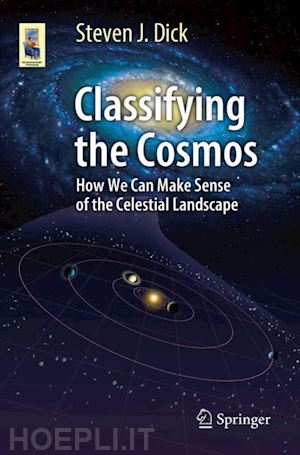

Questo prodotto usufruisce delle SPEDIZIONI GRATIS
selezionando l'opzione Corriere Veloce in fase di ordine.
Pagabile anche con Carta della cultura giovani e del merito, 18App Bonus Cultura e Carta del Docente
Since the invention of the telescope 400 years ago, astronomers have rapidly discovered countless celestial objects. But how does one make sense of it all?
Astronomer and former NASA Chief Historian Steven J. Dick brings order to this menagerie by defining 82 classes of astronomical objects, which he places in a beginner-friendly system known as "Astronomy’s Three Kingdoms.” Rather than concentrating on technicalities, this system focuses on the history of each object, the nature of its discovery, and our current knowledge about it.
The ensuing book can therefore be read on at least two levels. On one level, it is an illustrated guide to various types of astronomical wonders. On another level, it is considerably more: the first comprehensive classification system to cover all celestial objects in a consistent manner.
Accompanying each spread are spectacular historical and modern images. The result is a pedagogical tour-de-force, whereby readers can easily master astronomy’s three realms of planets, stars, and galaxies.
Dedication.- Acknowledgements.- Abbreviations.- Introduction to Astronomy’s Three Kingdoms.- Part 1: The Kingdom of the Planets.- Chapter 1: Family: Protoplanetary.- Chapter 2: Family: Planet.- Chapter 3: Family: Circumplanetary.- Chapter 4: Family: Subplanetary.- Chapter 5: Family: Interplanetary Medium.- Chapter 6: Family: Systems.- Part II: The Kingdom of the Stars.- Chapter 7: Family: Protostellar.- Chapter 8: Family: Star.- Chapter 9: Family: Circumstellar.- Chapter 10: Family: Substellar.- Chapter 11: Family: Interstellar Medium.- Chapter 12: Family: Systems.- Part III: The Kingdom of the Galaxies.- Chapter 13: Family: Protogalactic.- Chapter 14: Family: Galaxy.- Chapter 15: Family: Circumgalactic.- Chapter 16: Family: Subgalactic.- Chapter 17: Family: Intergalactic Medium.- Chapter 18: Family: Systems.- About the Author.- Index.
Steven J. Dick held the 2014 Baruch S. Blumberg NASA/Library of Congress Chair in Astrobiology at the Kluge Center of the Library of Congress. In 2013 he testified before Congress on the subject of astrobiology. He served as the Charles A. Lindbergh Chair in Aerospace History at the National Air and Space Museum from 2011-2012, and as the NASA Chief Historian and Director of the NASA History Office from 2003-2009. Prior to that, he worked as an astronomer and historian of science at the U.S. Naval Observatory in Washington, D.C. for 24 years, including three years on a mountaintop in New Zealand. He obtained his B.S. in astrophysics (1971), and MA and PhD (1977) in history and philosophy of science from Indiana University.
Among his books are Plurality of Worlds: The Origins of the Extraterrestrial Life Debate from Democritus to Kant (Cambridge University Press, 1982) (translated into French), The Biological Universe: The Twentieth Century Extraterrestrial Life Debate and the Limits of Science (Cambridge University Press, 1996), and Life on Other Worlds (Cambridge University Press, 1998), the latter translated into Chinese, Italian, Czech, Greek and Polish. He has also authored (with James Strick) The Living Universe: NASA and the Development of Astrobiology (2004), and a comprehensive history of the U. S. Naval Observatory, Sky and Ocean Joined: The U. S. Naval Observatory, 1830-2000 (Cambridge University Press, 2003). The latter received the Pendleton Prize of the Society for History in the Federal Government. He is also editor of Many Worlds: The New Universe, Extraterrestrial Life and the Theological Implications (2000), and (with Keith Cowing) Risk and Exploration: Earth, Sea and Stars (NASA SP-2005-4701 (Washington, D.C., 2005), and numerous volumes in the NASA History series. His book Discovery and Classification in Astronomy: Controversy and Consensus was published by Cambridge University Press in 2013. He is editor of the The Impact of Discovering Life Beyond Earth, published by Cambridge University Press in November, 2015, and Historical Studies in the Societal Impact of Spaceflight (NASA, 2015). Dr. Dick's recent book, Astrobiology, Discovery and Societal Impact (Cambridge University Press, 2018) won the the 2019 PROSE award for Cosmology & Astronomy.
Dr. Dick is the recipient of the NASA Exceptional Service Medal, the Navy Meritorious Civilian Service Medal, the NASA Group Achievement Award for his role in NASA’s multidisciplinary program in astrobiology, the NASA Group Achievement Award for the book America in Space, and the 2006 LeRoy E. Doggett Prize for Historical Astronomy of the American Astronomical Society. In 2012 he was elected a Fellow of the American Association for the Advancement of Science (AAAS). He has served as Chairman of the Historical Astronomy Divisionof the American Astronomical Society, as President of the History of Astronomy Commission of the International Astronomical Union, and as President of the Philosophical Society of Washington. He is a member of the American Astronomical Society, the International Astronomical Union, and a corresponding member of the International Academy of Astronautics. In 2009 the International Astronomical Union designated minor planet 6544 stevendick in his honor.











Il sito utilizza cookie ed altri strumenti di tracciamento che raccolgono informazioni dal dispositivo dell’utente. Oltre ai cookie tecnici ed analitici aggregati, strettamente necessari per il funzionamento di questo sito web, previo consenso dell’utente possono essere installati cookie di profilazione e marketing e cookie dei social media. Cliccando su “Accetto tutti i cookie” saranno attivate tutte le categorie di cookie. Per accettare solo deterninate categorie di cookie, cliccare invece su “Impostazioni cookie”. Chiudendo il banner o continuando a navigare saranno installati solo cookie tecnici. Per maggiori dettagli, consultare la Cookie Policy.